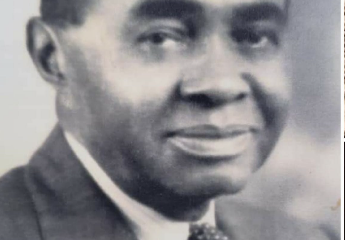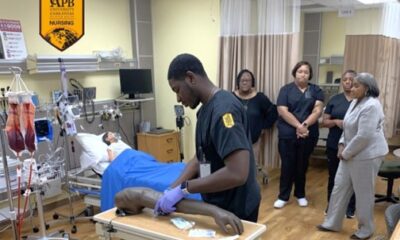Featured
The Power of the Black Vote – Part 2

South Carolina changed the race for President of the United States. An electorate which is more than 60 percent Black “reset” the 2020 Democratic campaign, according to a New York Times headline on March 2nd.
Former Vice President Joe Biden “won big” in the Feb 29th primary by almost 30 percentage points, narrowing Vermont Senator Bernie Sanders’ delegate lead to six. He won every single one of the state’s counties. With 528,719 votes cast in 2020, he almost reached President Barack Obama’s record number of 532,000 votes in 2008.
After polls closed in South Carolina, Billionaire businessman Tom Steyer dropped out of the race. He told a crowd of supporters that “I got into this race because I thought that people were not adequately addressing racial injustice in this country.” He also said that “I thought that we were at risk because of climate change and that expressed itself in terms of environmental justice.”
The next day, former South Bend Mayor Pete Buttigieg made an eloquent exit, making history with his win in the Iowa Caucuses as the first openly gay presidential candidate. Like Steyer, he talked about diversity. He noted, “We sent a message to every kid out there wondering if that whatever marks them as different means that they are somehow destine to be less than. To see that someone who felt exactly that same way can become a leading American presidential candidate with his husband at his side.”
Roughly 500 miles away from Mayor Pete’s rally in South Bend, civil rights groups took over the stage prior to a planned rally, leading Minnesota Senator Amy Klobuchar to cancel it. Earlier in the week, she also had abandoned South Carolina on Feb 26, days before primary day. Her campaign’s struggle with Black voters was a contributing factor to the end of her presidential bid.
On Monday, the Minnesota Senator joined Mayor Pete and others in endorsing Biden, adding momentum to the South Carolina victory and a much-needed surge donations that came in over the weekend.
The Palmetto state is not the end of the story. The Black vote on March 3rd is powerful in Alabama, North Carolina, Tennessee, Arkansas and Virginia. In the 2016 Democratic primaries, African Americans were 54 percent of the vote in Alabama, 32 percent in North Carolina and Tennessee, 27 percent in Arkansas and 26 percent in Virginia. As this nation becomes more diverse, these percentages are expected to grow.
The number one and two delegate-rich states, California and Texas, are considered strongholds for Latinx voters. This analysis alone discounts the large number of Black voters in major cities, like Houston and Los Angeles, and the role that this bloc can play in helping a candidate cross the minimum state threshold of 15 percent to receive delegates.
Despite the hype about the 2020 race, less than 4 percent of the vote is in. The outcome of the 14 Super Tuesday states will decide one-third of all delegates that nominate the Democratic candidate for president at the Party’s July convention in Milwaukee.
Fortunately, all three former presidential candidates encouraged their supporters to stay active. And they continue to lead by example, reiterating their commitment to beat a divisive administration.
Mayor Pete uplifted his supporters and a larger audience with wise words, stating that “We must win the era for our values.” Let’s vote and inspire others to vote.
Holli L. Holliday is a practicing attorney and president of Sisters Lead Sisters Vote, a nonprofit c4 organization for, by and of black women.

-

 Black History5 months ago
Black History5 months agoThe untold story of a Black woman who founded an Alabama hospital during Jim Crow
-

 Featured9 months ago
Featured9 months ago‘No Closure’ In Town Where Five Black Residents Were Either Murdered, Died Suspiciously Or Are Missing
-

 Black History10 months ago
Black History10 months agoBlack History Lost and Found: New Research Pieces Together the Life of Prominent Texas Surgeon and Activist
-

 Featured9 months ago
Featured9 months agoFounder of “The Folding Chair” Podcast Calls Montgomery’s Brawl ‘Karma’
-

 Featured9 months ago
Featured9 months agoThousands ‘Live Their Dream’ During National Black Business Month
-

 Featured11 months ago
Featured11 months agoJuneteenth And ‘246 Years Of Free Labor’ Are Key To Conversations About Reparations









